人体隐喻
2021德汉语“身体部位”隐喻的异同分析范文3
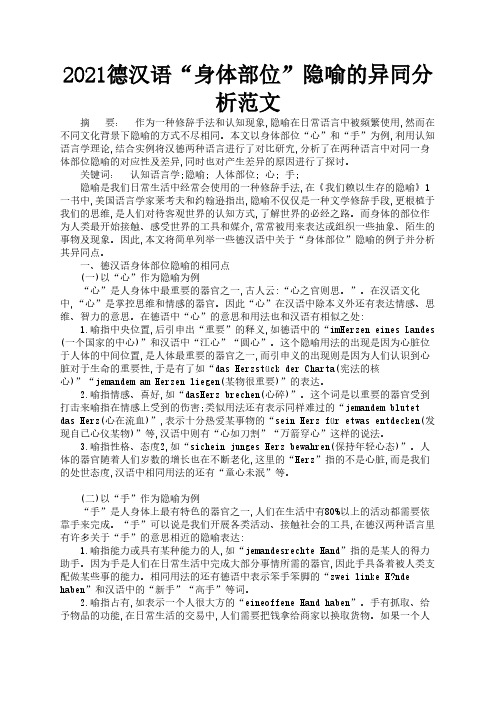
2021德汉语“身体部位”隐喻的异同分析范文 摘要: 作为一种修辞手法和认知现象,隐喻在日常语言中被频繁使用,然而在不同文化背景下隐喻的方式不尽相同。
本文以身体部位“心”和“手”为例,利用认知语言学理论,结合实例将汉德两种语言进行了对比研究,分析了在两种语言中对同一身体部位隐喻的对应性及差异,同时也对产生差异的原因进行了探讨。
关键词: 认知语言学;隐喻; 人体部位; 心; 手; 隐喻是我们日常生活中经常会使用的一种修辞手法,在《我们赖以生存的隐喻》1一书中,美国语言学家莱考夫和约翰逊指出,隐喻不仅仅是一种文学修辞手段,更根植于我们的思维,是人们对待客观世界的认知方式,了解世界的必经之路。
而身体的部位作为人类最开始接触、感受世界的工具和媒介,常常被用来表达或组织一些抽象、陌生的事物及现象。
因此,本文将简单列举一些德汉语中关于“身体部位”隐喻的例子并分析其异同点。
一、德汉语身体部位隐喻的相同点 (一)以“心”作为隐喻为例 “心”是人身体中最重要的器官之一,古人云:“心之官则思。
”。
在汉语文化中,“心”是掌控思维和情感的器官。
因此“心”在汉语中除本义外还有表达情感、思维、智力的意思。
在德语中“心”的意思和用法也和汉语有相似之处: 1.喻指中央位置,后引申出“重要”的释义,如德语中的“imHerzen eines Landes (一个国家的中心)”和汉语中“江心”“圆心”。
这个隐喻用法的出现是因为心脏位于人体的中间位置,是人体最重要的器官之一,而引申义的出现则是因为人们认识到心脏对于生命的重要性,于是有了如“das Herzstück der Charta(宪法的核心)”“jemandem am Herzen liegen(某物很重要)”的表达。
2.喻指情感、喜好,如“dasHerz brechen(心碎)”。
这个词是以重要的器官受到打击来喻指在情感上受到的伤害;类似用法还有表示同样难过的“jemandem blutet das Herz(心在流血)”,表示十分热爱某事物的“sein Herz für etwas entdecken(发现自己心仪某物)”等,汉语中则有“心如刀割”“万箭穿心”这样的说法。
人体的隐喻(五)
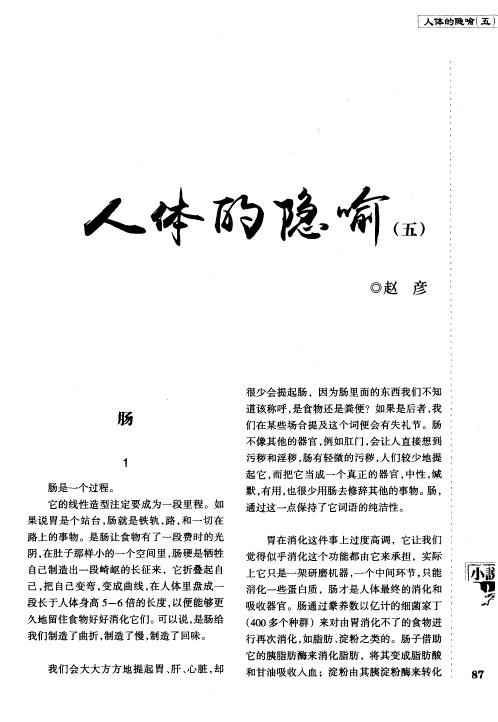
个空间, 并不发挥作用。 它也不像 胃那样一
天三次 地犯 “ 作” , 更不像 肺那样无时无 刻不 让你操劳——为 了肺 ,你得让嘴巴和鼻子同
时工作 , 至少得让其中一个呆在岗位上。
我们对脾的无知得 自于它与死亡的关系 的疏离 , 它很少会患上让你致命的疾病。 脾的 主要功能是参与人体的免疫反应 ,吞噬和清
3 U
中国古代一种叫做 “ 挂肠” 的酷刑 。其刑 罚极其残忍 : 施刑者在一根横木上绑上一根 绳子 , 并将横木高挂在一个木架子上 。 这个木 架子木杆的一端置有一个铁钩 ,另一端挂着
一
因为这样的原 因,脾在人体里就像一个朴实
的网管 ,一个 闷头 闷脑 的 I T男 。与脾相 比,
我们会 大大方方地提起 胃、 肝、 心脏 , 却
世
象 }
成单糖 , 包括葡萄糖和果糖等 , 最后被 吸收入 血。 也就是说 , 血液有一大半成分是从肠子里
刑者将铁钩放下来塞入犯人 的肛 门,将犯人 大肠头拉 出来挂在铁钩上 ,然后往下拉另一 端 的石块 , 这样 , 当铁 钩的一端升起 , 犯人的 肠子就被抽出来 ,并高悬挂成 条直线 。如 此, 犯人不一会儿就气绝身亡。
说, 食管 、 咽喉、 胃、 肝、 肾、 肛门都是肠进化的产
物。 如今 , 人类的进化已经可以将肠视作次要的
器官了, 一个失去肠子的人, 若其他器官功能健
全的话, 还能活上五六年。 古人 认为 人体 内最 重要 的 内脏 是 心和 肠, 心用来思考 , 肠用来消化 , 所 以有 “ 懒心无 肠” 这个成语 。心和肠是人体最重要 的内存 , 要是没有它们 , 人就是一具空皮囊。 一个头脑
一
简约 , 它们舍弃了其他器官唯独保留了肠子 , 甚
人体隐喻词翻译对比研究
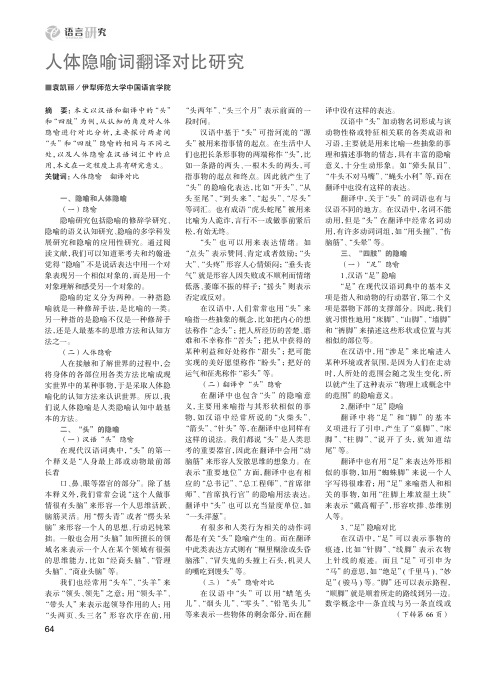
64人体隐喻词翻译对比研究■袁凯丽/伊犁师范大学中国语言学院摘 要:本文以汉语和翻译中的“头”和“四肢”为例,从认知的角度对人体隐喻进行对比分析,主要探讨两者间“头”和“四肢”隐喻的相同与不同之处,以及人体隐喻在汉语词汇中的应用,本文在一定程度上具有研究意义。
关键词:人体隐喻 翻译对比一、隐喻和人体隐喻(一)隐喻隐喻研究包括隐喻的修辞学研究、隐喻的语义认知研究、隐喻的多学科发展研究和隐喻的应用性研究。
通过阅读文献,我们可以知道莱考夫和约翰逊觉得“隐喻”不是说话表达中用一个对象表现另一个相似对象的,而是用一个对象理解和感受另一个对象的。
隐喻的定义分为两种。
一种指隐喻就是一种修辞手法,是比喻的一类。
另一种指的是隐喻不仅是一种修辞手法,还是人最基本的思维方法和认知方法之一。
(二)人体隐喻人在接触和了解世界的过程中,会将身体的各部位用各类方法比喻成现实世界中的某种事物,于是采取人体隐喻化的认知方法来认识世界。
所以,我们说人体隐喻是人类隐喻认知中最基本的方法。
二、“头”的隐喻(一)汉语“头”隐喻在现代汉语词典中,“头”的第一个释义是“人身最上部或动物最前部长着口、鼻、眼等器官的部分”。
除了基本释义外,我们常常会说“这个人做事情很有头脑”来形容一个人思维活跃、脑筋灵活。
用“愣头青”或者“愣头呆脑”来形容一个人的思想、行动迟钝笨拙。
一般也会用“头脑”加所擅长的领域名来表示一个人在某个领域有很强的思维能力,比如“经商头脑”、“管理头脑”、“商业头脑”等。
我们也经常用“头车”、“头羊”来表示“领头、领先”之意;用“领头羊”、“带头人”来表示起领导作用的人;用“头两页、头三名”形容次序在前,用“头两年”、“头三个月”表示前面的一段时间。
汉语中基于“头”可指河流的“源头”被用来指事情的起点。
在生活中人们也把长条形事物的两端称作“头”,比如一条路的两头、一根木头的两头,可指事物的起点和终点。
因此就产生了“头”的隐喻化表达,比如“开头”、“从头至尾”、“到头来”、“起头”、“尽头”等词汇。
人体隐喻与汉语人体器官类俗语的文化内涵

人体隐喻与汉语人体器官类俗语的文化内涵
中国以古老的文化和智慧,将中国汉语中的人体相关词语与社会状况相关,将生活智慧体
现在汉语中。
隐喻是中国文化传统中一种多样的语言表达方式,众多的人体隐喻也体现出
汉语文化的丰富多样性和精深性。
比如有“腿断了坐不稳,脖子断了站不稳” 、“腿短要跑不快” 、“眉毛长拄
拐杖”等比喻,隐含了早期农耕文化中,脖子断了的人无法稳站,腿断了的人坐不稳,
腿短的人跑不快,大眉毛的人养不活自己,等一些观念,从中可以看出当时耕作文化中生
活的艰辛,一些身体残废的人无法得到应有的基本的生活保障,必须依靠街坊邻里的帮助,才能维持生活。
明世宗御史钱隆九总督,在记录大学士陈光标和王维贤事迹时记载:“王恭先医病益损,
众人图挽,皆谓‘病来如春蚕吐丝’。
冠盖思维,谓其‘耳后把门锁,口中买酒,廓中
读经’”,此段文字运用人体隐喻,指人有时极端伤残,若未能及时治疗,过程如同晨蚕
吐丝,极度人丧,如此种种,言简意赅,充满富有的文化内涵,体现出当时对于生命的观念,尊重和珍惜生命,完备的体现了汉语文化的精深性。
综上所述,中国汉语中的人体类比喻与在汉语文化中所传承的含义和文化内涵,体现出中
国古老文化的深厚底蕴,以及中华民族的智慧和生活学问,充分证明汉语文化是千古流传
的古老文化。
英汉名词性人体隐喻之比较
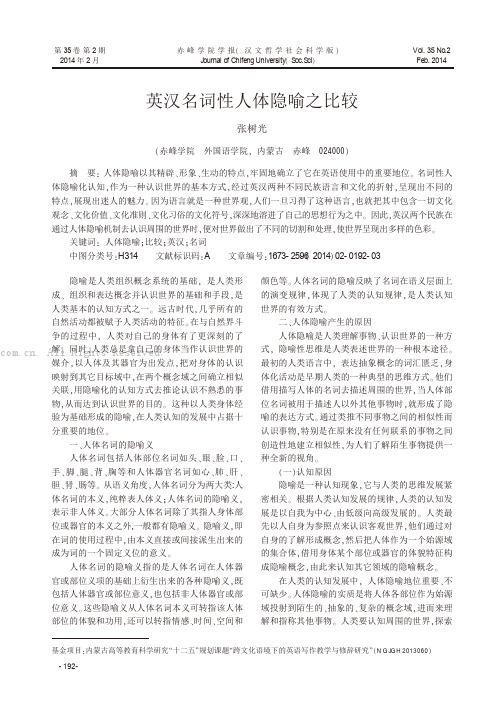
隐喻是人类组织概念系统的基础,是人类形成、组织和表达概念并认识世界的基础和手段,是人类基本的认知方式之一。
远古时代,几乎所有的自然活动都被赋予人类活动的特征。
在与自然界斗争的过程中,人类对自己的身体有了更深刻的了解。
同时,人类总是拿自己的身体当作认识世界的媒介,以人体及其器官为出发点,把对身体的认识映射到其它目标域中,在两个概念域之间确立相似关联,用隐喻化的认知方式去推论认识不熟悉的事物,从而达到认识世界的目的。
这种以人类身体经验为基础形成的隐喻,在人类认知的发展中占据十分重要的地位。
一、人体名词的隐喻义人体名词包括人体部位名词如头、眼、脸、口、手、脚、腿、背、胸等和人体器官名词如心、肺、肝、胆、肾、肠等。
从语义角度,人体名词分为两大类:人体名词的本义,纯粹表人体义;人体名词的隐喻义,表示非人体义。
大部分人体名词除了其指人身体部位或器官的本义之外,一般都有隐喻义。
隐喻义,即在词的使用过程中,由本义直接或间接派生出来的成为词的一个固定义位的意义。
人体名词的隐喻义指的是人体名词在人体器官或部位义项的基础上衍生出来的各种隐喻义,既包括人体器官或部位意义,也包括非人体器官或部位意义。
这些隐喻义从人体名词本义可转指该人体部位的体貌和功用,还可以转指情感、时间、空间和颜色等。
人体名词的隐喻反映了名词在语义层面上的演变规律,体现了人类的认知规律,是人类认知世界的有效方式。
二、人体隐喻产生的原因人体隐喻是人类理解事物、认识世界的一种方式,隐喻性思维是人类表述世界的一种根本途径。
最初的人类语言中,表达抽象概念的词汇匮乏,身体化活动是早期人类的一种典型的思维方式。
他们借用描写人体的名词去描述周围的世界,当人体部位名词被用于描述人以外其他事物时,就形成了隐喻的表达方式。
通过类推不同事物之间的相似性而认识事物,特别是在原来没有任何联系的事物之间创造性地建立相似性,为人们了解陌生事物提供一种全新的视角。
(一)认知原因隐喻是一种认知现象,它与人类的思维发展紧密相关。
认知视角下人体部位词的隐喻研究
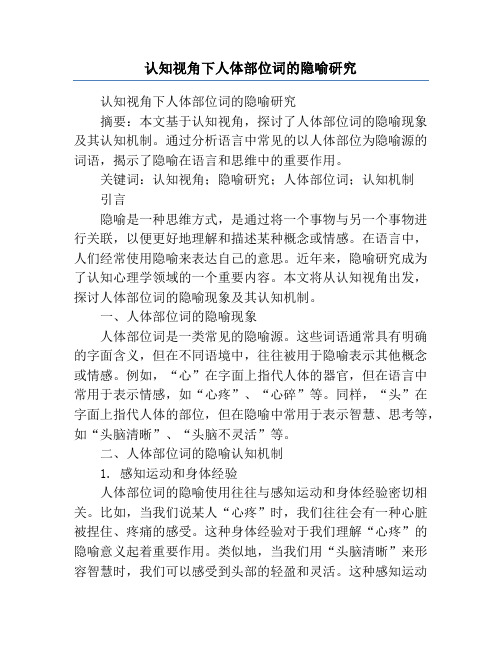
认知视角下人体部位词的隐喻研究认知视角下人体部位词的隐喻研究摘要:本文基于认知视角,探讨了人体部位词的隐喻现象及其认知机制。
通过分析语言中常见的以人体部位为隐喻源的词语,揭示了隐喻在语言和思维中的重要作用。
关键词:认知视角;隐喻研究;人体部位词;认知机制引言隐喻是一种思维方式,是通过将一个事物与另一个事物进行关联,以便更好地理解和描述某种概念或情感。
在语言中,人们经常使用隐喻来表达自己的意思。
近年来,隐喻研究成为了认知心理学领域的一个重要内容。
本文将从认知视角出发,探讨人体部位词的隐喻现象及其认知机制。
一、人体部位词的隐喻现象人体部位词是一类常见的隐喻源。
这些词语通常具有明确的字面含义,但在不同语境中,往往被用于隐喻表示其他概念或情感。
例如,“心”在字面上指代人体的器官,但在语言中常用于表示情感,如“心疼”、“心碎”等。
同样,“头”在字面上指代人体的部位,但在隐喻中常用于表示智慧、思考等,如“头脑清晰”、“头脑不灵活”等。
二、人体部位词的隐喻认知机制1. 感知运动和身体经验人体部位词的隐喻使用往往与感知运动和身体经验密切相关。
比如,当我们说某人“心疼”时,我们往往会有一种心脏被捏住、疼痛的感受。
这种身体经验对于我们理解“心疼”的隐喻意义起着重要作用。
类似地,当我们用“头脑清晰”来形容智慧时,我们可以感受到头部的轻盈和灵活。
这种感知运动和身体经验帮助我们将人体部位词与其他概念或情感进行关联。
2. 回忆和经验积累隐喻往往依赖于个体的回忆和经验积累。
人们通过长时间的语言和文化传承,将某些人体部位与特定概念或情感关联起来。
这些关联会在个体的语言运用和思维过程中产生影响。
例如,“手”经常被用于表示援助和帮助,这可能与我们在婴儿时期接受到的依赖和帮助有关。
这种回忆和经验积累为我们理解和使用人体部位词的隐喻意义提供了基础。
3. 集体文化价值观隐喻现象不仅与个体的经验和认知有关,也与集体的文化价值观密切相关。
不同文化对于人体部位词隐喻的使用和理解可能存在差异。
汉语中的人体隐喻与反隐喻
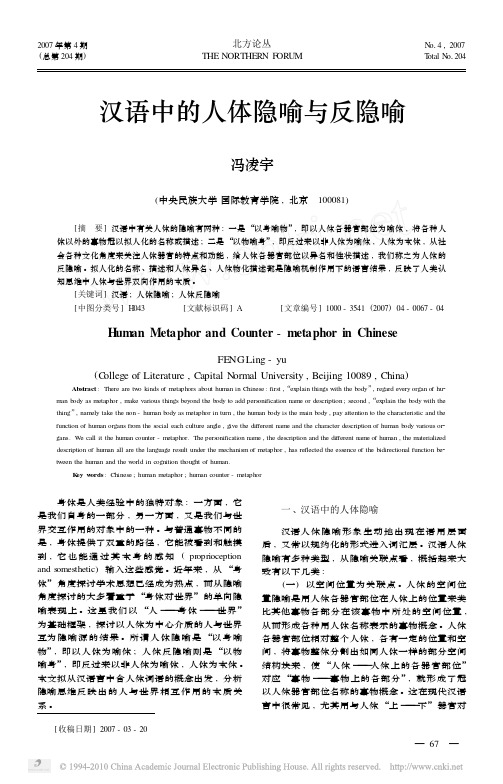
汉语中的人体隐喻与反隐喻冯凌宇(中央民族大学国际教育学院,北京 100081)[摘 要]汉语中有关人体的隐喻有两种:一是“以身喻物”,即以人体各器官部位为喻体,将各种人体以外的事物冠以拟人化的名称或描述;二是“以物喻身”,即反过来以非人体为喻体,人体为本体,从社会各种文化角度来关注人体器官的特点和功能,给人体各器官部位以异名和性状描述,我们称之为人体的反隐喻。
拟人化的名称、描述和人体异名、人体物化描述都是隐喻机制作用下的语言结果,反映了人类认知思维中人体与世界双向作用的本质。
[关键词]汉语;人体隐喻;人体反隐喻[中图分类号]H043 [文献标识码]A [文章编号]1000-3541(2007)04-0067-04H uman Metaphor and Counter -metaphor in ChineseFE NGLing -yu(C ollege of Literature ,Capital Normal University ,Beijing 10089,China )Abstract :There are tw o kinds of metaphors about human in Chinese :first ,“explain things with the body ”,regard every organ of hu 2man body as metaphor ,make various things bey ond the body to add pers onification name or description ;second ,“explain the body with the thing ”,namely take the non -human body as metaphor in turn ,the human body is the main body ,pay attention to the characteristic and the function of human organs from the s ocial each culture angle ,give the different name and the character description of human body various or 2gans.W e call it the human counter -metaphor.The pers onification name ,the description and the different name of human ,the materialized description of human all are the language result under the mechanism of metaphor ,has reflected the essence of the bidirectional function be 2tween the human and the w orld in cognition thought of human.K ey w ords :Chinese ;human metaphor ;human counter -metaphor[收稿日期]2007-03-20 身体是人类经验中的独特对象:一方面,它是我们自身的一部分,另一方面,又是我们与世界交互作用的对象中的一种。
论隐喻在人体器官词中的应用体现
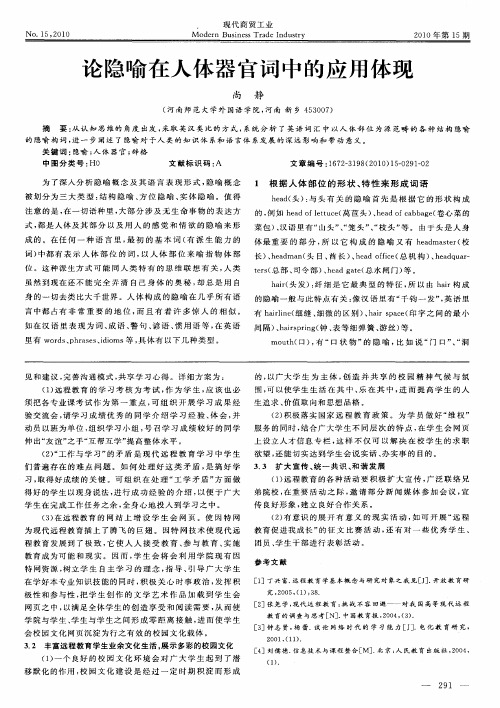
为 了 深 入 分 析 隐 喻 概 念 及 其 语 言 表 现 形 式 , 喻 概 念 隐 被 划 分 为 三 大 类 型 : 构 隐 喻 、 位 隐 喻 、 体 隐 喻 。值 得 结 方 实 注 意 的是 , 一 切 语 种 里 , 部 分 涉 及 无 生 命 事 物 的 表 达 方 在 大
的, 以广 大 学 生 为 主 体 , 造 并 共 享 的 校 园 精 神 气 候 与 氛 创 围 , 以 使 学 生 生 活 在 其 中 、 在 其 中 , 而 提 高 学 生 的 人 可 乐 进
须 把 各 专 业 课 考 试 作 为 第 一 重 点 , 组 织 开 展 学 习 成 果 经 生 追 求 、 值 取 向 和 思 想 品 格 。 可 价 验交 流会 , 学 习成 绩 优 秀 的 同学 介 绍 学 习经 验 、 会 , 请 体 并 ( ) 极 落 实 国家 远 程 教 育 政 策 。 为 学 员 做 好 “ 权 ” 2积 维
现 代 商 贸 工 业
N O.1 201 5。 0
Mo enB s e rd n uty d r ui s T aeId s ns r
21 0 0年 第 1 期 5
论 隐 喻 在 人 体 器 官 词 中 的 应 用体 现
尚 静
( 南 师 范 大 学 外 国语 学 院 , 南 新 乡 4 3 0 ) 河 河 5 0 7 摘 要 : 认 知 思 维 的 角 度 出发 , 取 英 汉 类 比 的 方 式 , 统 分 析 了 英 语 词 汇 中 以 人 体 部 位 为 源 范 畴 的 各 种 结 构 隐喻 从 采 系
mo t ( ) 有 “ 状 物 ”的 隐 喻 , 如 说 “ 口” “ uh 口 , 口 比 门 、 洞
见 和 建 议 , 善 沟 通 模 式 , 享 学 习 心 得 。详 细 方 案 为 : 完 共 ( ) 程 教 育 的 学 习 考 核 为 考 试 , 为 学 生 , 该 也 必 1远 作 应
- 1、下载文档前请自行甄别文档内容的完整性,平台不提供额外的编辑、内容补充、找答案等附加服务。
- 2、"仅部分预览"的文档,不可在线预览部分如存在完整性等问题,可反馈申请退款(可完整预览的文档不适用该条件!)。
- 3、如文档侵犯您的权益,请联系客服反馈,我们会尽快为您处理(人工客服工作时间:9:00-18:30)。
The difference of body-part metaphor in Chinese andEnglishAbstract: The sense of people is originate ourselves and extend to our round. This way of perceive things in language is metaphor. When it reflects on bodies of people is called the body-part metaphor. The record is according to the cognitive view and rule of metaphor. From the study, I discovered that there were externalization and internalization in body-part metaphor. Subject and object have not been completely separated. The world human knows is not the world itself, but a humanized world.K eyword: body-part metaphor, externalization, internalization, humanization world.Ⅰ, Externalization in body-part metaphor1, The metaphor of head1.1, Head is the top of somethingFor example, in Chinese, 山顶(the head of mountain),针头(head of needle)绳子的两头(a rope has two heads). In English, head of a match, head of page, head of a queue, head of flower, head of stairs, head of a bed,1.2, Head is starting point and terminal poin tIn Chinese”head “ has many meanings. For example, in Chinese, 起头(it means start). 从头做起(it means start all over again from the beginning). 从头再来(it means start all over again). 从头到尾(it means from beginning to the end). 从头开始(it means start anew).1.3, head is the firstFor example, in Chinese, 头等(it means the first). 首都(it means capital of one country). 首屈一指(it means second to none). 首当其冲(it means throw one self into the breach).1.4, head is aspectIn Chinese, it means one person do something need to give consideration to two or more things.1.5, head is lifeIn Chinese, 抛头颅洒热血(it means one person contribute his or her life to something). In English, for example it cost him his head. Put one’s head in/into noose.1.6, head is ability of thinkingIn Chinese, for example, 头脑灵活(it means one person is so clever). In English, for example, He is weak in the head. He lost his head. He doesn’t have a head for mathematic. Use your head. The phrase has keep one’s head screwed on the right way. It means the thinking of one person is clearly. Have a good head for something, it means a person can control something.A level head, it means a person is dispassionate. Scratch one’s head, it means one person is confused to something. Go off one’s head, it means one person is crazy. A wolly head, it means one person is confused.1.7, head means personFor example, in English hot head means a person of impatient disposition. A head/per head means everyone or one person.1.8, head is the leader of a groupIn Chinese, 首领,头领,元首,首脑mean a leader of the group. In English, the head of the department and the head of a class.1.9, head is the keyFor example, in English it comes to a head. It means this is very serious moment in time.1.10, head means feelingFor example, in Chinese, 垂头丧气(it means one person’s mood is down).In English, for example, to hold one’s head high, to be off one’s head, to go to somebody’s head, to lose one’s head, hot-headed, to have a swelled head.2, The metaphor of “face”2.1, The face is something or external appearanceF or example, in Chinese 版面(the appearance of the book), 路面(the appearance of the road), 桌面(the appearance of the table),. I n English, face ofa mountain, face of a building, face of the earth, face of a clock.2.2, The face means peopleF or example, in C hinese, 新面孔(it means new people).In English, a new face, different, a famous/well-known face.2.3, Face of a person or organization performance their way to other peopleF or example, in Chinese, 面貌(it means the appearance of one person).In English, the acceptable face of Soviet foreign policy. He may have difficulty persuading the security force to adopt a more human face.2.4, The face is the dignity and reputationFor example, in Chinese, 有面子(have dignity), 要面子(want to have dignity), 丢脸(lose one’s dignity).In English, lose face, save face, have the face to do something.2.5, The face is the focus of interaction and relationshipFor example in Chinese, 当面(face to face).In English, face to face. For example, They call their teacher ’Fatty’, but never to his face.2.6, Face the emotional responseFor example, in Chinese, 愁眉苦脸(it means one person’s mood is down), 笑脸(it means one person is so happy), 脸色(it means complexion). In English, a happy face, a smiling face, an angry face, be double-faced, pull/put on/have/wear a long face.2.7, Face reflected in the spatial domainFor example, in Chinese, 前面(in front of something), 东面(east), 南面(south),西面(west), 北面(north).In English, in the face of , the north face of the mountain.3, The metaphor of “eye”3.1, The eye is the hole of one thingFor example, in Chinese, 龙眼(it means the source of water), 泉眼(it means the source of spring), 枪眼(it means The loophole).In English, the eye of the storm(a storm’s center), eye of potato, eye in a flower, hooks and eyes, eye of a hurricane, the eye of a needle.3.2, Eye means lookFor example, in Chinese, 眼见为实(Seeing is believing), 亲眼所见(see), 眼疾手快(Sharp eyes and agile hands or nimble fingers), 触目惊心(See the scene which is dreadful to one's mind), 一目了然(Stick out a mile).In English, for example, Would you cast your eye over these calculation to check that they are correct. His eyes fell upon an advertisement in the magazine. The government sems to be closing its eyes to the plight of the unemployed. You can’t justshut your eyes to your problems and hope they’ll go away. The manager turneda blind eye when his staff were late.3.3, Understanding is seeIn Chinese, for example, 在我看来(in my opinion), 独具慧眼(Have a special insight understanding), 鼠目寸光(Short-sighted), 世界观(World outlook), 人生观(Outlook on life), 悲观(Pessimism), 乐观(Optimistic), 客观(Objective), 宏观(Macroscopic).In English, for example, In my eyes, it is a very sound investment. The way he deceived me opened my eye to his true character. Developing an eye for a horse is not something which can be taught via a book.3.4, Eye observation, judgment ability of foodFor example, in Chinese, 有眼光(Good taste), 眼高手低(Have grandiose aims but puny abilities).In English, have a good eye for something, to my eye.3.5, For the foreseeable futureFor example, in Chinese, 目标(goal). In English, with an eye to.4, The metaphor of “ear”4.1, Ear means listenFor example, in Chinese, 耳闻(listen),耳熟能详(For having heard it many times), 耳聪目明(Have good ears and eyes).In English, She has sharp ears. He tried to give a sympathetic ear to the patient.4.2, Ear refers to the ability of a thing to understand or judge heardIn English, for example, He has always had a good ear for a tune. I’m proud of my extraordinarily good ear for accents and dialects.5, The metaphor of “nose”5.1, The surface uplift or hole part is the noseFor example, in Chinese, 门鼻儿(The door handle).In English, the nose means the head of train.5.2, The nose means discover or ability to find thingsFor example, in English, He had a nose for a situation. If there was something amiss, he sensed it. He had a nose for trouble and a brilliant tactical mind.5.3, To explore the noseIn English, for example, stick/poke your nose, it means p ut one 's finger into another's pie or To interfere in other people's private affairs.5.4, Nose means find out, the ability to recognizeIn English, for example, have a good nose for, that means A natural at for something.7, The metaphor of “mouth”7.1, Artifacts and figured partIn Chinese, for example, 瓶子口(The opening of the bottle), 碗口(bowl), 窗口(the window). In English, mouth means the opening of bottles.7.2, mouth means Exit and entranceIn Chinese, for example, 洞口(the hole), 火山口(crater), 风口(Tuyere). In English, for example, mouth of a hole, mouth of a tunnel, mouth of a cave, mouth of a river, mouth of a well, mouth of a volcano.7.3, mouth means expressFor example, in Chinese, 口吃(stutter), 口碑(word of mouth), 口才(Eloquence), 口若悬河(Talk rapidly), 口口声声( keep on proclaiming). In English, open your mouth.7.4, mouth means peopleFor example, in Chinese, 拖家带口(Have family burden), 五口之家(a family of five). I n English, a useless mouth, that means foolish. Big mouth is unusual way to use, it means A talkative person.8. The metaphor of “tongue”8,1 The object is extended part of tongueFor example, in Chinese, 帽舌(the visor), 火舌(flames). In English, a tongue of land, a tongue of a flame.8,2 tongue means sayFor example, in Chinese, 饶舌(rap), 舌战(war of words), 费口舌(Waste of breath). In English, slip of tongue, bite one’s tongue, loosen somebody’s tongue, find one’s tongue.8,3 tongue means languageIn English, Latin was for hundreds of years the common tongue to much of Europe.8,4 tongue means the way to talkFor example, in English, She has an acid tongue, she can raise laughs at other people’s expense. He was also by nature an intellectual bully with a cutting tongue.ⅡThe internal organs of metaphor1, The metaphor of “heart”1,1 heart is the center of one thingFor example, in Chinese, 中心(center), 圆心(the heart of the circle), 靶心(the bull’s eye), 球心(the center of the ball). In English, heartland, the heart of the city, the heart of a cabbage.1,2 The heart is a pointed head, shaped like a heart objectsFor example, in Chinese, “V” means Heart-shaped. In English, purple, a kind of dragon.1,3 heart means importantFor example, in Chinese, 心肝(baby).In English, sweet heart, the heart of the matter.1,4 heart means conscienceFor example, in Chinese, 良心(conscience), 扪心自问(Lay the hand on the heart and examine oneself), 问心无愧(feeling no shame). In English, search one’s heart.1,5 heart means courageFor example, in Chinese, 灰心丧气(get disheartened). In English,take/gather heart, to lose heart. In sentences, for example, Take heart, for all is not lost. And, until now he had managed to keep up his classes at the University, but he lost heart for study and dropped out of school.Except that, we can use heart like this, never the heart and keep one’s heart up.1,6 The heart is the carrier of emotionFor example, in Chinese, 心潮澎湃(Be full of excitement ), 扣人心弦(exciting), 心乱如麻(The mind is very confused). In English, when you feel happy and excited, we can use, for one’s heart bleed for somebody, lose one’s heart to somebody, have one’s heart in the right place, wear one’s heart on one’s sleeve. When you feel sad and upset, we can use, break somebody’s heart, for one’s heart to sink, heart-ache, heart tending. When you feel scared, we can use, have one’s heart in one’s boots, have one’s heart in one’s mouth, for one’s heart to miss a beat, for one’s heart to turn.2, The metaphor of “bile”In Chinese, bile means courage. F or example, 胆量(guts), 狗胆包天(Monstrous audacity), 胆大妄为(reckless). In English, bile means have no shame.F or example, have the gall to do something.3, The metaphor of stomach3,1 stomach means interested in somethingIn English, if you want to express the thing is not conform to your hobby, you can use, it goes against my stomach. And if you do not like do something, you can say have no stomach for a fight/talk.3,2 stomach means to bear unpleasant things.F or example, don’t watch that film unless you have a strong stomach.4, The metaphor of visceral4,1 visceral means courage, willpower and determination.In English, She has guts, which is unusual in a young actress.Y ou do not need capital to start in business, you need guts and the absolute belief that you will succeed.4,2 visceral means t he instinctive reactionIn English, gut reaction/feeling/instinct and so on. For example, he had a gut feeling that Sarah was buying. W hen you want to say do something as you feel, we can use at gut level. F or example, she knew at gut level that he was guilty.5, The metaphor of blood5,1 Blood is the main genetic materialIn Chinese, 血缘(Blood kinship). In English, we can use blood as follows: My father regretted that he himself had no Jewish blood. He is got Spanish blood in him. He will be your husband’s closet blood relative.5,2 blood is natural instinctsI n English, we can say as follows: Acting is in her blood. I am a man of the countryside. I t is in my blood.5,3 blood means moodF or example, in Chinese, 热血沸腾(One's blood boils with indignation), 血气方刚(full of sap). In English, bad blood, it means one person is so angry;hot-blooded, it means The mood is very fierce.5,4 blood means peopleFor example: It is good to have some new blood in the department. T he meaning is new persons in the department is a good thing.6, The metaphor of bone6,1 bone means An object plays a supporting roleFor example, in Chinese, 伞骨(bracket of the umbrella).6,2 bone means The most basic contentIn English, if we want to say basic content, we can use the bare bones.F or example: This is just the bare bones of the plan – it is still in theearly stage.6,3 bone means limitF or example, in English, close, it means Someone has said or writtensomething they hate but the truth, so annoying. And something is cut or pared to the bones is means something was decreased greatly.7, The metaphor of nerve7,1 nerve means moodF or example, in English, get on one’s nerve, it means someone is soangry. A nd set one’s nerves on edge is means that the person is so upset.7,2 nerve means courageF or example, in English, have the nerve to do something , it takesa lot of nerve to do something and lose one’s nerve and so on. H ave a nervewas used in oral language. I t means have no shame.Based on the above, The most basic in the metaphor phenomenon of human cognition, metaphor, the most common than body metaphor. Because the basic law of the cognition of the world people are from the near to the distant, from concrete to abstract. While the human is so recent, most closely related to things, so early in the history of human civilization, people around the word know external things always cannot help, without exception, to follow the “in the body, from the objects of law” and it equals to People always put his body including the brain as a measure of the things around, the cognitive experience of human use of other objects of cognition, theconcept of projection for human to another object, so as to construct a new concept for this object. Thus,Human metaphorical thinking is one of the primitive human is one of the most widespread and important way of thinking.11402 027 闫池。
